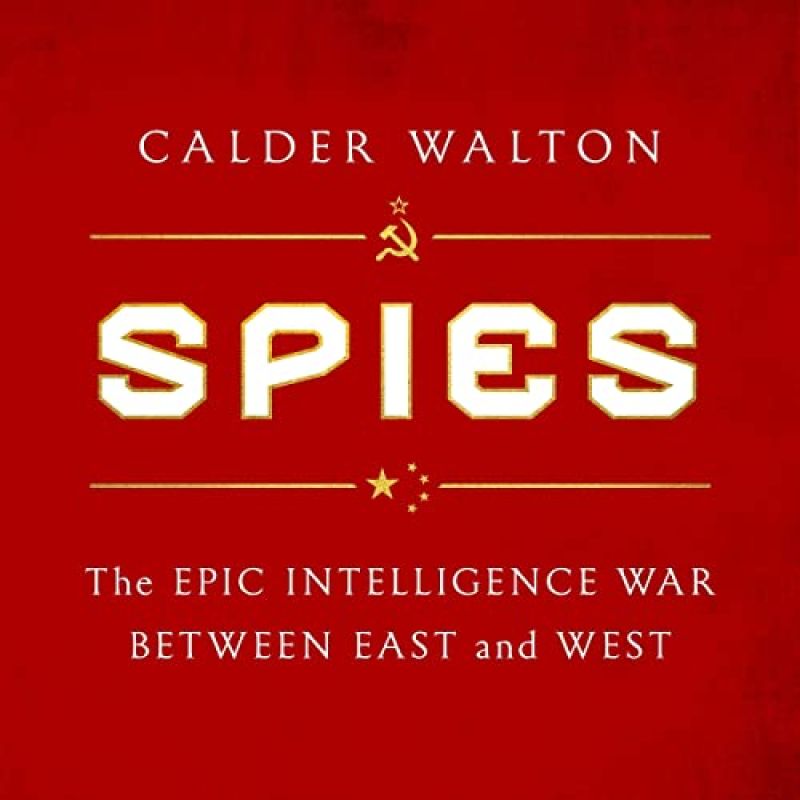“Spies” by Calder Walton
My Rating

I really enjoyed this book having worked in the world of EW – Electronic Warfare during my service in the British Army, and sending all that we learnt about Russia and East Germany back to GCHQ in Cheltenham. It gave me a fascinating insight into what Russia was and is really up to, and we should never be naive as this shows just how deep the deception and spying goes every day in the UK, America and against our allies.
In “Spies”, Calder Walton provides an enthralling exposition of the shadowy world of espionage, masterfully weaving together a tapestry of tales that showcases the ingenuity and audacity of the spies while also highlighting their human vulnerabilities.
Top Lessons from Russia’s Prowess in Espionage for the UK and the US:
- Constant Vigilance: Russia has a long history of espionage, and its operations have been sophisticated and persistent. The UK and the US must be consistently vigilant and prepared for potential threats.
- Hybrid Warfare: Russia has effectively combined traditional espionage with cyber-attacks, disinformation campaigns, and other asymmetric tactics. Recognizing and countering this multifaceted approach is crucial.
- Human Assets: While technology is vital, human intelligence remains a cornerstone of Russian espionage. Counterintelligence efforts should prioritize detecting and neutralizing insider threats.
- Disinformation Campaigns: Modern Russian espionage often goes hand-in-hand with disinformation. The UK and US must invest in media literacy programs and ensure that the public is informed about the risks of misleading information.
- Secure Communication: Many espionage operations succeed due to intercepted communications. Governments must adopt the latest encryption technologies and protocols for sensitive communication.
History of Espionage Scandals Involving Russia, the UK, and the US:
- Cambridge Spy Ring (1950s-1960s): A group of British double agents, including Kim Philby, Guy Burgess, and Donald Maclean, passed critical information to the Soviets during the Cold War. Their infiltration of the British establishment, including the MI6, caused significant damage to UK intelligence.
- Aldrich Ames (1985-1994): Ames, a CIA officer, spied for the Soviet Union and later Russia. He revealed several US assets in Russia, leading to the execution of at least ten US informants.
- Robert Hanssen (1979-2001): An FBI agent, Hanssen spied for Soviet and Russian intelligence services for over two decades. His betrayal led to the compromise of numerous US intelligence operations and the exposure and execution of US assets in Russia.
- Anna Chapman and the Illegals Program (2010): The US arrested ten Russian spies in 2010, including Anna Chapman. These “illegals” lived under deep cover in the US without direct ties to Russian diplomats or official establishments, aiming to gather intelligence and influence policy.
- Salisbury Poisoning (2018): Sergei Skripal, a former Russian double agent living in the UK, and his daughter were poisoned with the Novichok nerve agent. The UK government accused Russia of the attempted assassination, marking a significant moment of tension between the two countries.
- US Election Interference (2016): US intelligence agencies concluded that Russia attempted to interfere in the 2016 Presidential election to favor Donald Trump. This included cyber-attacks, propaganda, and disinformation campaigns, leading to significant investigations and tensions between the US and Russia.
In the intricate dance of espionage, the players, methods, and tactics constantly evolve. Russia’s historical prowess in the world of spies provides a reminder to nations like the UK and the US about the importance of constant vigilance, modernisation, and innovation in counterintelligence efforts. The world may have shifted from the Cold War era’s cloak-and-dagger operations to today’s cyber-driven espionage, but the stakes remain just as high, if not higher.
This great book, while rooted in the world of espionage, have broad applicability in today’s digital age.
Top 10 Tips for Leaders in Business to Avoid Being Deceived and Spied Upon:
- Stay Educated: Continually educate yourself on the latest cybersecurity threats and trends. Knowledge is the first line of defence against deception.
- Vet Your Inner Circle: Surround yourself with trusted individuals and regularly assess their loyalty and integrity. Remember, many espionage cases have been the result of betrayal from the inside.
- Limit Access: Not every employee needs access to all information. Implement strict data access controls, ensuring that sensitive data is only accessible to those who truly need it.
- Two-Factor Authentication: This might seem basic, but it’s crucial. Always use two-factor authentication (2FA) for all critical systems and accounts. It provides an additional layer of security, ensuring that even if a password is compromised, the attacker can’t gain access.
- Regular Audits: Conduct regular security audits to identify and rectify potential vulnerabilities in your IT infrastructure.
- Beware of Social Engineering: Train your staff to recognise and report potential social engineering attempts. Phishing, baiting, and tailgating are techniques used by spies and hackers alike to gain unauthorised access.
- Limit Digital Footprints: Be cautious about what you share online. Information shared on social media can be used to craft highly targeted phishing attacks or to gain insights into potential vulnerabilities.
- Travel Wisely: When traveling, especially internationally, use encrypted communication tools, avoid public Wi-Fi, and consider using a temporary phone.
- Physical Security: While digital espionage is a significant concern, physical break-ins can be just as damaging. Ensure your premises have tight security, including surveillance, alarms, and access controls.
- Foster a Culture of Security: Finally, it’s not enough for leaders alone to be vigilant. Ensure that your entire organisation values security. Regularly train employees on best practices and encourage a culture where security is everyone’s responsibility.
In conclusion, “Spies” by Calder Walton is more than just a recounting of the daring escapades of spies. It is a seminal work that illuminates the intricate world of espionage and offers invaluable advice for those seeking to navigate it safely. For business leaders in our increasingly connected world, this book is not just a captivating read but a vital manual for survival.